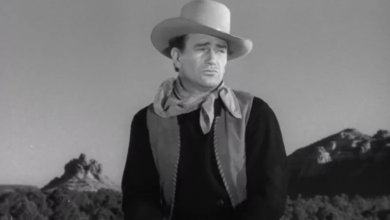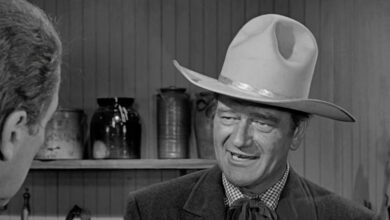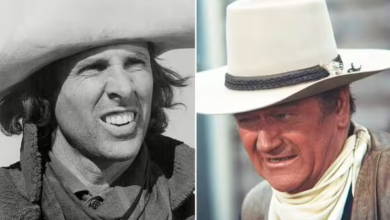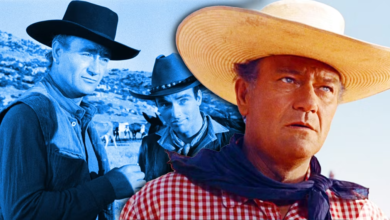Introducing ‘Do We Get to Win This Time?’
‘Do We Get to Win This Time?’ is a podcast about how Vietnam movies have shaped the way we think about the Vietnam War. In the first episode, host Brian Raftery tells the stories of early Vietnam movies like John Wayne’s ‘The Green Berets’ and the piercing documentary ‘Hearts and Minds.’
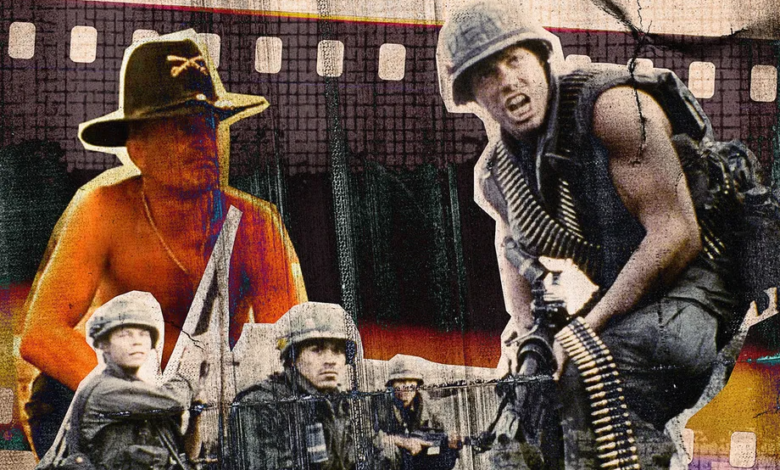
John Wayne was an American icon and a guy who defined the war film—and maybe war itself—for generations of moviegoers.
Nowadays, it’s impossible to talk about John Wayne, the Oscar-winning movie star, without also talking about John Wayne, the unapologetic racist. The Duke’s been dead for more than 40 years, yet every once in a while, his infamous 1971 Playboy interview—in which he said, and I quote, “I believe in white supremacy”—gets passed around the internet in disbelief.
For much of the 20th century, though, Wayne was absolutely adored: a superpatriot who’d starred not only in dozens of Westerns, but also in blockbuster World War II dramas—movies like The Longest Day, in which he played a real-life paratrooper leading men into battle on D-Day.
Wayne despised Communism, and by the mid-’60s, he’d become a vocal supporter of America’s involvement in Southeast Asia. He’d written a letter to Congress describing anti-war protestors as “Berkeley beatniks.” And he’d gone to Vietnam and hung around with American grunts, some of whom he stayed in touch with long afterward.
Around the time of those visits, Wayne bought the rights to Robin Moore’s bestseller The Green Berets, a fictionalized account of Moore’s experience as a journalist in Vietnam.
But despite the book’s success, it wasn’t easy to get the green light for The Green Berets.
Columbia turned it down. Universal said yes, then quickly backed out. Wayne … blamed the liberals. But in reality, Hollywood still wanted nothing to do with Vietnam. In 1966, the war would claim the lives of more than 6,000 Americans—three times the number of the year before. Studios were canceling Vietnam films across town. They were simply bad for business.
As one executive put it: “Nobody wants to see guys getting killed in the Vietnam War when guys are getting killed in the Vietnam War.”
Even without that baggage, The Green Berets was a tough sell. War movies are expensive, and this one featured massive battle scenes.
Then there was the very unsubtle screenplay, which one studio exec described as “the worst I’ve ever read.” The movie follows a skeptical reporter who tags along with the Green Berets, watching them kill numerous Vietnamese. No studio wanted to take a stand on Vietnam, and the pro-war message of The Green Berets was loud and clear.
Still, for all the studio indifference to The Green Berets, this was John Wayne, and after more than a year, he convinced Warner Bros. to make the film, on a budget of $7 million—about $60 million today.
He also got help, albeit indirectly, from Lyndon Johnson. The two men needed each other: Johnson knew public support for the war was wavering, and Wayne needed the military. He was producing, starring in, and codirecting The Green Berets. If the movie was going to look real, he needed some heavy-duty machinery.
So, in 1965, Wayne sent the president a letter asking for help and then, according to one account, followed it up with a phone call.
The request worked. Wayne sent an eight-page list to the Department of Defense, outlining what he wanted. Tanks. Machine guns. Cargo planes. He also got permission to film on a military base in Georgia, as well as access to hundreds of troops—all funded with taxpayer money.
In exchange, the military got approval over the script. The Green Berets would be a pro-America film, overseen by a famously pro-America movie star. And it would all be made with American guns and gear.
Wayne knew exactly what kind of Vietnam movie he was making. Years later, he’d describe The Green Berets for what it was: “propaganda.”
This excerpt was edited for clarity. Listen to the rest of the episode here and follow the Big Picture feed on Spotify.
Host: Brian Raftery
Producers: Devon Manze, Mike Wargon, Amanda Dobbins, and Vikram Patel
Sound Design: Bobby Wagner
Mixing and Mastering: Scott Somerville


